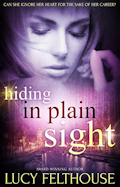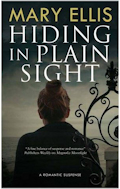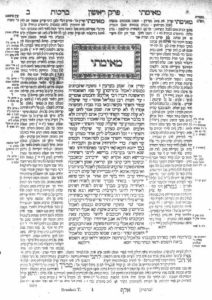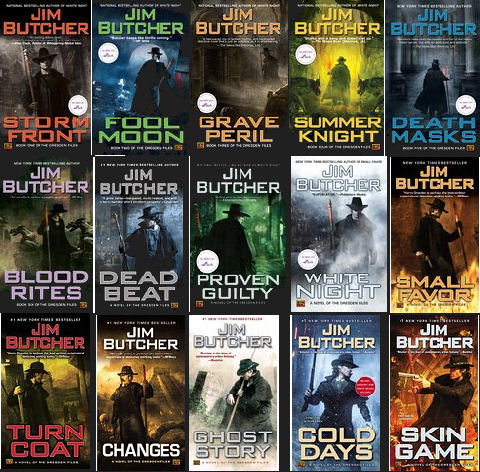Hidings in Plain Sight
We’re in quarantine, and what is there to do besides lots of TV, movies, online surfing, gaming, and reading. A couple of friends recommended the new book Hiding in Plain Sight, by Sarah Kendzior, a journalist, about the “rise of” Donald Trump. When I sought it out, it turned out there a whole slew of books with the title Hiding in Plain Sight, and what the heck, it was a “project”.
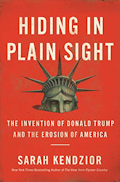 Hiding in Plain Sight: The Invention of Donald Trump and the Erosion of America
Hiding in Plain Sight: The Invention of Donald Trump and the Erosion of America
Sarah Kendzior
I hate to say it, but… yawn, and no. Given her background in journalism and her history of pointing to “the dark times”, I have to say I expected a hell of a lot more. Basically the book is a bunch of repackaged info from various articles and opinion pieces we’ve been subjected to over the last four years plus since Trump became a prominent figure in the political world. Her primary news source seems to be Buzzfeed, and while not to denigrate them as a news source, they’re certainly not the be all and end all of political and economic news. Other than a brief glance at Trump’s early years, one would think on reading this book that he, the state of the U.S. both economically and politically, all began somewhere around the year 2000, during the Bush 2 years, and that it all came as a complete shift in the landscape of America from that moment on, and took everyone by surprise. Except her, of course, because she’s been sounding the alarm since then, basically the year she graduated from college. How prescient. The book focuses much on Trump’s connection to Russia, both to the Putin government and to shadowy crime figures in the Russian mafia in New York City, some named, some not – the vast majority of it based on his real estate dealings with various Russians, and little else. She also stoops to the tired, anti-semitic tropes of various “Jewish” finance figures – and before anyone jumps to point out that some of those figures Trump dealt with were, indeed, Jewish, let me just point out in return, she doesn’t refer to any of the myriad of other finance figures he’s dealt with over the years as “Christian”, “Muslim”, “Hindu”, “Buddhist”, or any other religions – but she makes sure to identify each Jew as a Jew, even down to reminding us more than once that Jared Kushner, Trump’s son-in-law, is “one of them”. I finished off the book feeling like a needed a shower. Not just from the possibility that some or even all, of what she wrote might be true (I’m not discounting that it may well be), but from her blatant biases. ☆☆
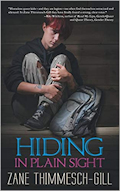 Hiding in Plain Sight: A Street Kid’s Journey from Female to Male
Hiding in Plain Sight: A Street Kid’s Journey from Female to Male
Zane Thimmesch-Gill
Not a book I would normally gravitate towards, but I’m glad I read it. It was a fascinating first person memoir of a “FTM”, or female to male, transgender teen, ostracized from, at the time, “her” family, following through to a mix of attempts at foster home living, living on the street, living in shelters, and more. All the while, she does her best to maintain high school and later, college studies, while coming to grips with one form of gender dysphoria that ultimately leads her partially down the path to a transition to being male. While we don’t know the eventual outcome, it’s clear that there’s no one path for him. For the most part the book is highly engaging, and paints a picture of a life that most of us can’t begin to imagine. At times it seems a bit overblown, and I found myself thinking, “how could you react to this situation like this, where someone is trying to help/be kind”, but, I’ve also never been in the situation, and no doubt there are psychological and physiological factors that I can’t fathom without having lived it. Worth a read. ☆☆☆☆
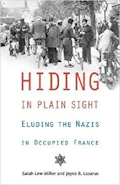 Hiding in Plain Sight: Eluding the Nazis in Occupied France
Hiding in Plain Sight: Eluding the Nazis in Occupied France
Sarah Lew Miller
A quick read. Understandably, given the subject matter – a teenage Jewish girl’s story of her family’s survival during WWII, it’s kind of hard not to compare it to the more famous work of Anne Frank. But it’s not the same story – different countries, different situations, different outcomes. It lacks some of the intensity of the famed Diary, mostly because she, and her family, are able to basically continue to live their lives. They get jobs, they find places to live, they have neighbors and friends, they have people who help them and care for them. It’s still a very poignant story, and a reminder of a time not all that long ago. And, of course, given the times we’re living in, it’s difficult not to also consider the lives of people around the world during the current pandemic, and the different levels of existence that different people, in various cultures, are experiencing. Well worth a read. ☆☆☆☆
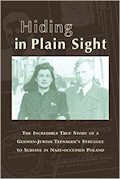 Hiding in Plain Sight: The Incredible True Story of a German-Jewish Teenager’s Struggle to Survive in Nazi-Occupied Poland
Hiding in Plain Sight: The Incredible True Story of a German-Jewish Teenager’s Struggle to Survive in Nazi-Occupied Poland
Betty Lauer
Staying in virtually the same theme, we once again have a teenager’s diary, in essence, of the same. So, I’ll start it with the same opening as the previous review…. Understandably, given the subject matter – a teenage Jewish girl’s story of her family’s survival during WWII, it’s kind of hard not to compare it to the more famous work of Anne Frank. But it’s not the same story – different countries, different situations, different outcomes. The book is well written, and although phrased in first person, is, as above, an “as told to”, by the author. The life of young Berta Weissberger, and the place and time that the book covers, are actually pretty interesting, a bit more so, or perhaps it’s just the quality of the writing, than the previous book. The biggest issue in this book is that the book is almost as interminable as the six years it covers – it goes on for nearly 600 pages, detailing day to day life in, at times, excruciatingly unnecessary detail, as one day after another often looks much like the previous day. Still, I found it an engaging read and worth recommending. ☆☆☆☆
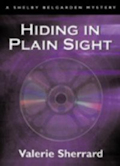 Hiding in Plain Sight: A Shelby Belgarden Mystery
Hiding in Plain Sight: A Shelby Belgarden Mystery
Valerie Sherrard
Without meaning to be flip about it, this is the sort of book that people who like this sort of book will like. It’s a cute mystery, a bit “Nancy Drew” – all teenage girls and giggles and crushes and the like. As such, it’s not my cup of tea, but then, I’m not the target audience for the book either. It’s clearly a “YA” book aimed at the teen set of the female gender. Maybe because I read a lot of mysteries, or maybe just because the author makes sure to point out the clues, several of them repeatedly, in a sort of “this will be on the test” manner, but I’d basically worked out the whole thing by a little over halfway through the book. If you’re a teenage girl who likes easy reading mysteries, you may well enjoy this. ☆☆☆
Lucy Felthouse
I… just can’t. I’m not even sure if it was well written, it was just so far outside my personal comfort zone to read that I couldn’t give you an honest assessment of that. Nothing red flagged me with major grammar or spelling typos, so, there’s that. But, basically, it’s a soft-porn novel that pretends to be about a supposed professional, experienced spy. One who just turns to jelly when a handsome man looks at her, and a) can’t get her and his clothes off fast enough, b) immediately heads into the “oooh, a man likes me and he’s sexy and kisses well, maybe I should give it all up for love, and c) can’t keep her mind on her job. Professional…? I don’t get the hype and high reviews for this book – unless they’re all coming from very, very, lonely people. ☆☆
Mary Ellis
A well written, fast paced, easy read of a private detective novel. I like the style, I found the principal characters likable. And, I don’t mind that there’s a clear Catholic bent to both the writing and the story – I assume that that’s the author’s background and she brings what she knows to make the novel work. But, there are negatives. The secondary characters are a bit caricatured, right out of central casting stereotypes for Italian Americans; the Catholicism takes momentary negative turns with snide or disparaging remarks or thoughts on the part of the principals towards other Christians, and, no doubt the horror to end all horrors, those of either lapsed faith, or… can we use the word, atheists; and last, while not limited to this author, why does it seem like every female detective needs to fall head over heals in love with some guy who she randomly meets on a case? (If anyone can point me to a detective series with a strong female protagonist who doesn’t go that route, I’m interested!) It was still an enjoyable read, though the negatives are enough that I don’t find myself moved to continue on to other books in the series. ☆☆☆
This seems a good place wrap up this post, with a septet of books delved into. There are plenty more of the same name, plus a slew of Hide in Plain Sight, or just In Plain Sight. On the fiction side they seem to bounce between romance and detective novels, while on the non-fiction side, there’s a hunt for Nazis, a bible truths tome, a book of investing essays, and more. Whether I come back to this venture remains to be seen. It was an interesting approach to finding things to read that I might not normally be on the lookout for, and instead, I might just try something similar with another title. Time will tell.
